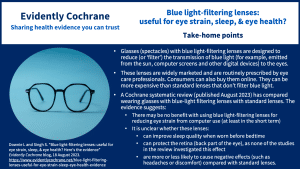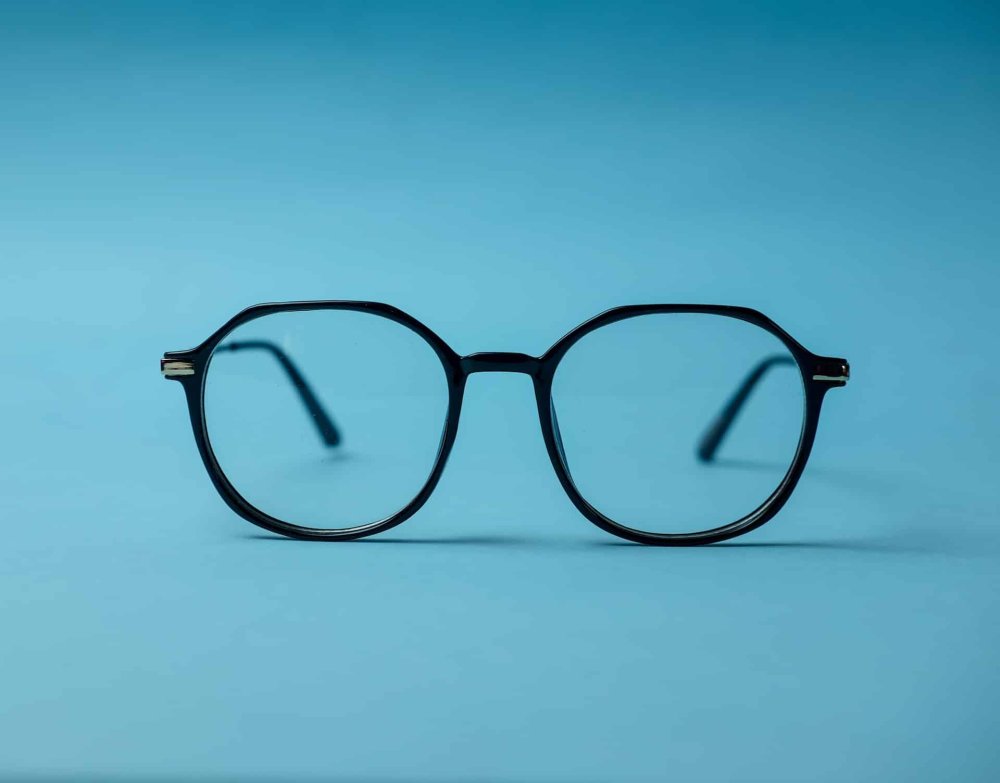Glasses with blue light-filtering lenses are widely marketed and routinely prescribed by eye care professionals. It has been claimed these lenses can help with reducing eye strain, improving sleep, and protecting eye health. But do they live up to the hype, and are they worth the cost? In this blog, Associate Professor Laura Downie and Dr Sumeer Singh look at the latest evidence from their recent Cochrane ReviewCochrane Reviews are systematic reviews. In systematic reviews we search for and summarize studies that answer a specific research question (e.g. is paracetamol effective and safe for treating back pain?). The studies are identified, assessed, and summarized by using a systematic and predefined approach. They inform recommendations for healthcare and research..
Take-home points

You may have heard claims that glasses with blue light-filtering lenses can do things for your eyesight and overall well-being that standard lenses can’t, like reduce eye strain from screen use and improve your sleep. Despite uncertainty about the benefits, some studies indicate that eye care practitioners have been prescribing them increasingly over the past decade. We did a Cochrane Review to find out whether the best available evidence can support the claims and whether these lenses are likely to be worth the cost.
First, a bit about blue light and the lenses that filter it.
What is blue light?
Blue light is the part of the visible light spectrum with relatively shorter wavelengths and higher energy than other visible light (that is, the green to red portion of the colour spectrum). Sunlight is the main natural source of blue light. Artificial light sources also give out varying amounts of blue light, although this is a lot lower than from sunlight.
In today’s technology-driven world, we are often exposed to artificial light, from sources such as fluorescent and light-emitting diode (LED) bulbs, computer screens and other digital devices. This has raised questions about the potential negative effects of blue light exposure on eye health, as well as general health and well-being.
What are blue light-filtering lenses?
Blue light-filtering spectacle lenses (also called “blue-blocking” lenses) are designed to selectively reduce (or ‘filter’) the transmission of short-wavelength visible light, particularly blue light, to the eyes. This is in contrast to standard spectacle lenses that do not filter blue light. Buying spectacle lenses with a blue light filter can be more expensive than standard lenses.
A variety of spectacle lenses that limit blue light transmission, to varying extents, have become available to buy over the past several years. Most products reduce blue light transmission to the eye by about 10 to 25%, although this varies.
The latest evidence on blue light-filtering lenses
A systematic review, which brings together and evaluates all the relevant clinical evidence, can help clarify whether wearing blue light-filtering lenses really does have benefits.
Our Cochrane Review (published August 2023) investigated the potential benefits and safety of blue light-filtering lenses on visual function, sleep, and protecting the retina (back part of the eye) compared to non blue light-filtering lenses. The review included randomised controlled trialsA trial in which a group (the ‘intervention group’) is given a intervention being tested (for example a drug, surgery, or exercise) is compared with a group which does not receive the intervention (the ‘control group’). (studies designed to test the effects of interventions) that evaluated blue light-filtering lenses in adults. A total of 17 studies with 619 people were included. The key findings of the review were:
- There is low-certaintyThe certainty (or quality) of evidence is the extent to which we can be confident that what the research tells us about a particular treatment effect is likely to be accurate. Concerns about factors such as bias can reduce the certainty of the evidence. Evidence may be of high certainty; moderate certainty; low certainty or very-low certainty. Cochrane has adopted the GRADE approach (Grading of Recommendations Assessment, Development and Evaluation) for assessing certainty (or quality) of evidence. Find out more here: https://training.cochrane.org/grade-approach evidence suggesting there may be no advantage with using blue light-filtering spectacle lenses to reduce eye strain compared to standard lenses (that don’t filter blue light). This conclusion is based on consistent findings from three clinical trialsClinical trials are research studies involving people who use healthcare services. They often compare a new or different treatment with the best treatment currently available. This is to test whether the new or different treatment is safe, effective and any better than what is currently used. No matter how promising a new treatment may appear during tests in a laboratory, it must go through clinical trials before its benefits and risks can really be known. that studied effects on eye strain over time periods ranging from two hours to five days.
- There is limited information about whether blue-light filtering lenses affect vision level (best corrected visual acuity). Only one clinical studyAn investigation of a healthcare problem. There are different types of studies used to answer research questions, for example randomised controlled trials or observational studies. reported relevant dataData is the information collected through research. and suggested little to no effect.
- It is uncertain whether wearing blue-light filtering lenses before bedtime can improve sleep quality, with inconsistent findings across six studies.
- Negative effects associated with using blue light-filtering lenses, such as people experiencing headaches, lowered mood and discomfort wearing the glasses, were reported in some studies. However, similar negative effects were also reported with the use of standard (non blue light-filtering) lenses. Overall, there were not enough data to draw clear conclusions about possible negative effects.
- No conclusions could be drawn about the possible effects of blue light-filtering lenses on several vision and eye health measures. None of the included studies investigated effects on:
- a person’s ability to detect differences in shading and patterns (contrast sensitivityA measure of a screening or diagnostic test’s ability to correctly detect people who have the disease.)
- capacity to distinguish different colours (colour discrimination)
- level of eye discomfort from bright light (discomfort glare)
- effects on the health of the back part of the eye responsible for central vision (macular health)
- None of the included studies investigated spectacle lens wearers’ overall satisfaction with their vision.
Advice to the public considering buying these products
Based on the current, best-available clinical research findings, there may be no advantages with using blue light-filtering spectacle lenses to reduce eye strain associated with computer use, compared to standard (non-blue-light filtering) lenses.
It is currently unclear whether these lenses affect vision quality or sleep, and no conclusions can be drawn about any potential effects on retinal health.
It is also uncertain whether people are more or less likely to experience negative effects (such as headaches or discomfort) when wearing blue light-filtering lenses compared with wearing standard lenses.
Advice to eye care professionals recommending these products
Overall, the review findings do not support the prescription of blue-light filtering lenses to the general populationThe group of people being studied. Populations may be defined by any characteristics e.g. where they live, age group, certain diseases. for the purpose of reducing eye strain with computer use. We note that this conclusion is based on relatively limited available data where the lenses were evaluated over relatively short time periods (i.e., two hours to five days in total).
Potential effects on sleep are unclear due to lack of clarity about how people with different medical conditions might, or might not, respond differently to these devices.
We did not find any evidence to support the use of blue-light filtering lenses, compared to non-blue-light filtering lenses, for providing macular protection as the studies were short in duration and did not evaluate this outcome.
As none of the studies included in the review evaluated outcomesOutcomes are measures of health (for example quality of life, pain, blood sugar levels) that can be used to assess the effectiveness and safety of a treatment or other intervention (for example a drug, surgery, or exercise). In research, the outcomes considered most important are ‘primary outcomes’ and those considered less important are ‘secondary outcomes’. related to visual function parameters (for example, contrast sensitivity, discomfort glare, colour discrimination) or patient visual satisfaction, no conclusions could be drawn about these outcomes.
Considering that an additional cost is typically associated with buying blue light-filtering spectacle lenses (compared with nonblue-light filtering lenses), it is important that practitioners convey this information about the best-available evidence to patients, as a foundation for evidence-based prescribing.
You can join in the conversation on Twitter with @CochraneUK @DrLauraDownie or leave a comment on the blog.
Please note, we cannot give specific medical advice and do not publish comments that link to individual pages requesting donations or to commercial sites, or appear to endorse commercial products. We welcome diverse views and encourage discussion but we ask that comments are respectful and reserve the right to not publish any we consider offensive. Cochrane UK does not fact-check – or endorse – readers’ comments, including any treatments mentioned.
The Cochrane Review:
Singh S, Keller PR, Busija L, McMillan P, Makrai E, Lawrenson JG, Hull CC, Downie LE. Blue‐light filtering spectacle lenses for visual performance, sleep, and macular health in adults. Cochrane Database of Systematic ReviewsIn systematic reviews we search for and summarize studies that answer a specific research question (e.g. is paracetamol effective and safe for treating back pain?). The studies are identified, assessed, and summarized by using a systematic and predefined approach. They inform recommendations for healthcare and research. 2023, Issue 8. Art. No.: CD013244. DOI: 10.1002/14651858.CD013244.pub2. Accessed 18 August 2023.
https://www.cochranelibrary.com/cdsr/doi/10.1002/14651858.CD013244.pub2/full
Disclosure of interest:
Laura Downie: Author on paper reporting findings from an investigator-intiated (University sponsored) randomised controlled trialA trial in which the people taking part are randomly divided into groups. A group (the intervention group) is given the intervention being tested (for example a drug, surgery, or exercise) and compared with a group which does not receive the intervention (the control group). evaluating the effects of blue-light filtering lenses on computer-induced eye strain: Singh S, Downie LE, Anderson AJ. Do Blue-blocking Lenses Reduce Eye Strain From Extended Screen Time? A Double-Masked RandomizedRandomization is the process of randomly dividing into groups the people taking part in a trial. One group (the intervention group) will be given the intervention being tested (for example a drug, surgery, or exercise) and compared with a group which does not receive the intervention (the control group). Controlled Trial. Am J Ophthalmol. 2021. RiskA way of expressing the chance of an event taking place, expressed as the number of events divided by the total number of observations or people. It can be stated as ‘the chance of falling were one in four’ (1/4 = 25%). This measure is good no matter the incidence of events i.e. common or infrequent. of biasAny factor, recognised or not, that distorts the findings of a study. For example, reporting bias is a type of bias that occurs when researchers, or others (e.g. drug companies) choose not report or publish the results of a study, or do not provide full information about a study. assessments in the Cochrane review were performed by independent authors.
Sumeer Singh: “As part of my PhD work, we conducted an investigator-initiated trial that investigated blue-light filtering lenses for treating symptoms of eye strain in computer users. The trial (Singh et al. 2021) is included in the present review, although ROB assessments were performed by independent co-authors. The trial was funded and sponsored by the University of Melbourne.”
Featured image by Redowan Dhrubo on Unsplash



[…] [17] https://www.evidentlycochrane.net/blue-light-filtering-lenses-useful-for-eye-strain-sleep-eye-health… […]
Is there any behavioral approach that has some strong or moderate evidence for sleep, like not watching electronic devices before you go to bed.
I would be inclined to say that almost all the recommended approaches for sleep are in the unclear category.